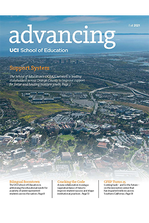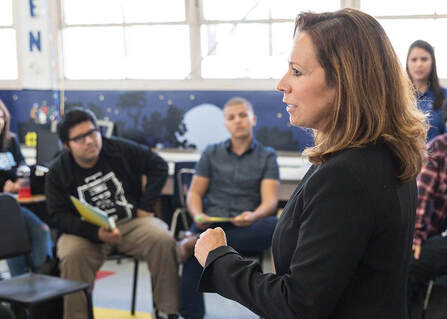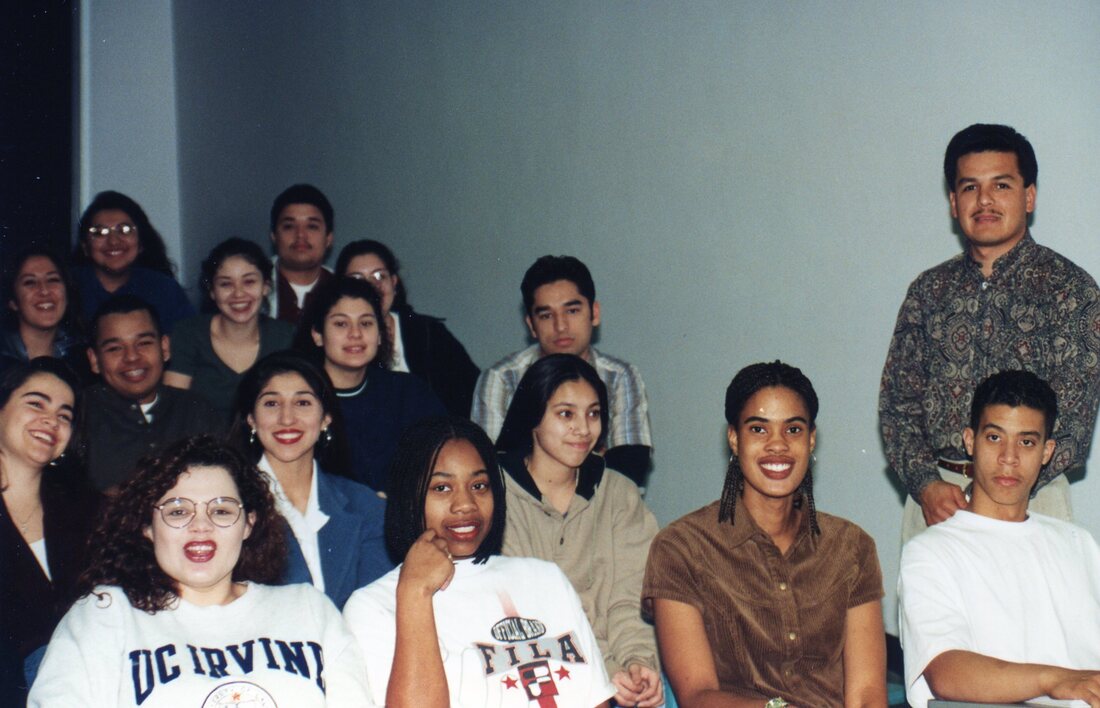Silver Anniversary, Gold Standard
Now in its 25th year, the UCI Center for Educational Partnerships has impacted millions of students, educators and families across Southern California.
During the 2021-22 academic year, the UCI Center for Educational Partnerships (CFEP) – a robust center in the School of Education that creates collaborations that support preparation for and success in higher education – is celebrating its 25th anniversary.
|
CFEP’s programs, partnerships and initiatives target the unique needs of four separate but interconnected groups: K-12 students, K-12 teachers, community college students looking to transfer, and UCI undergraduates. Combined, CFEP supports more than 13,000 students and families annually.
CFEP was the first such center in the UC system, and its overarching structure and the design of its programs have since been emulated at every UC campus. “For the past quarter century, CFEP has focused on equity and access for all students across Southern California,” said Stephanie Reyes-Tuccio, assistant vice chancellor, educational partnerships. “Our innovative partnerships with schools and communities change lives by helping students make their dreams of college a reality.” |
THE VISION
CFEP was formed in 1996 in response to California Proposition 209, which prohibited state governmental institutions from considering race, sex, or ethnicity in several areas, including college admissions. UCI felt it necessary to identify alternate means to ensure the continued enrollment of a diverse and highly qualified student population.
Key stakeholders at UCI – including former CFEP Director Juan Francisco Lara, and Manuel Gómez, former vice chancellor, student affairs – decided to organize and expand existing outreach programs and house them under one roof – CFEP.
The programs bucked two trends in higher education partnerships that were predominant at the time. First, many universities believed student inequity was primarily a result of a lack of information on various topics, such as financial aid, application and graduation requirements, and more. Second, universities were connecting with local K-12 schools by bringing together multiple district superintendents into one group, and then trying to effect change through the various needs and goals of the superintendents.
CFEP instead forged deep partnerships with local underserved schools and districts, most of which also serve students of color predominantly. By doing so, it eschewed both the simple “information dump” and the multiple superintendent approach, and was able to develop close, meaningful relationships that live on and continue to create lasting change today.
“We began a new concept of connecting UCI faculty with entire, specific schools in areas such as Santa Ana, Compton and Anaheim,” Gómez said. “This represented a major shift from information distribution models to academic, faculty-led preparatory models.”
Resources soon followed that led CFEP to create summer academic programs. With momentum now on its side, CFEP had extraordinary success in bringing K-12 students and teachers together with UCI faculty to strengthen K-12 curricula and teachers’ pedagogical practices.
Another major milestone occurred in 2002, when the National Science Foundation awarded CFEP a $14.2 million grant known as FOCUS: Faculty Outreach Collaborations Uniting Scientists, Students and Schools. The grant led to the creation of several STEM outreach programs, which collectively impacted more than 100,000 students from the Compton, Santa Ana, and Newport-Mesa school districts.
Key stakeholders at UCI – including former CFEP Director Juan Francisco Lara, and Manuel Gómez, former vice chancellor, student affairs – decided to organize and expand existing outreach programs and house them under one roof – CFEP.
The programs bucked two trends in higher education partnerships that were predominant at the time. First, many universities believed student inequity was primarily a result of a lack of information on various topics, such as financial aid, application and graduation requirements, and more. Second, universities were connecting with local K-12 schools by bringing together multiple district superintendents into one group, and then trying to effect change through the various needs and goals of the superintendents.
CFEP instead forged deep partnerships with local underserved schools and districts, most of which also serve students of color predominantly. By doing so, it eschewed both the simple “information dump” and the multiple superintendent approach, and was able to develop close, meaningful relationships that live on and continue to create lasting change today.
“We began a new concept of connecting UCI faculty with entire, specific schools in areas such as Santa Ana, Compton and Anaheim,” Gómez said. “This represented a major shift from information distribution models to academic, faculty-led preparatory models.”
Resources soon followed that led CFEP to create summer academic programs. With momentum now on its side, CFEP had extraordinary success in bringing K-12 students and teachers together with UCI faculty to strengthen K-12 curricula and teachers’ pedagogical practices.
Another major milestone occurred in 2002, when the National Science Foundation awarded CFEP a $14.2 million grant known as FOCUS: Faculty Outreach Collaborations Uniting Scientists, Students and Schools. The grant led to the creation of several STEM outreach programs, which collectively impacted more than 100,000 students from the Compton, Santa Ana, and Newport-Mesa school districts.
|
“This was and is astounding – for an administrative center to have received a grant from the NSF,” Gómez said. “It just doesn’t happen.”
Advancing through the 21st century, as CFEP became more sophisticated and robust, the center began adding programs that Gómez describes as “intergenerational.” In these, UCI undergraduates began working with K-12 students, UCI graduates worked with undergraduates, and UCI professors worked with all the aforementioned groups. “We were looking at how to permanently restructure the curricular experiences for these students so that they better understood the university system,” Gómez said. “We brought them onto campus so that they could experience and feel the campus and feel that it was part of their home.” In 1996, when UC campuses were still figuring out how to adapt to life post-Proposition 209, CFEP served as a beacon for others to emulate. |
“Juan and Manuel were ahead of the game,” said Dennis Galligani, who previously worked as the assistant vice chancellor, academic affairs for UCI and, at the time of CFEP’s creation, served as the associate vice president, student academic services for the UC Office of the President. “In 1996, the UC Office of the President was looking to enhance the outreach and partnerships that the UCs engaged in. UCI was the leader in those areas, and now it’s spread system-wide.”
While CFEP has been emulated in some fashion at all UC campuses, UCI remains the only such CFEP that focuses on K-12 students, teachers, community college students, and UCI undergraduates.
“This goes back to the vision of Dr. Lara,” Reyes-Tuccio said. “All these groups of students are connected. If you want to effect change for any one group, and you don’t have an understanding and an awareness of what’s going on with the other groups, then you’re always going to be missing a piece of the puzzle.”
While CFEP has been emulated in some fashion at all UC campuses, UCI remains the only such CFEP that focuses on K-12 students, teachers, community college students, and UCI undergraduates.
“This goes back to the vision of Dr. Lara,” Reyes-Tuccio said. “All these groups of students are connected. If you want to effect change for any one group, and you don’t have an understanding and an awareness of what’s going on with the other groups, then you’re always going to be missing a piece of the puzzle.”
A PLETHORA OF PARTNERSHIPS
Over the years, CFEP has been home to dozens of programs, partnerships, and initiatives.
This includes the Anaheim Pledge – a partnership signed in 2017 with the Anaheim Union High School District, the North Orange Community College District, California State University, Fullerton, the City of Anaheim, and local nonprofits, business and civic partners. The pledge is a commitment to provide all students with an intentional, comprehensive support system that is designed to ensure access to opportunities and services that prepares students to successfully complete their college and career goals.
In 2018, CFEP began hosting the UCI Teacher Academy, a professional development center that provides a home for K-12 teachers and school leaders to develop and enhance their professional practice. Through a multi-faceted approach, the Teacher Academy supports all teachers throughout the entire educator lifecycle – from aspiring teachers to senior administrators. In three years, the Teacher Academy network has grown to include more than 10,000 educators representing 173 school districts from across California.
CFEP also hosts programs that predate the center itself, including the Early Academic Outreach Program (EAOP). Since 1983, the EAOP has helped students in underserved schools prepare for college and the workforce through academic enrichment programs, academic advising, test preparation, and college enrollment workshops.
“Everything is built around the EAOP,” Reyes-Tuccio explained. “At its core, the EAOP helps ensure students are taking and passing A-G courses and filling out their FAFSA and college applications. Helping students and families make these critical steps is job number one."
This includes the Anaheim Pledge – a partnership signed in 2017 with the Anaheim Union High School District, the North Orange Community College District, California State University, Fullerton, the City of Anaheim, and local nonprofits, business and civic partners. The pledge is a commitment to provide all students with an intentional, comprehensive support system that is designed to ensure access to opportunities and services that prepares students to successfully complete their college and career goals.
In 2018, CFEP began hosting the UCI Teacher Academy, a professional development center that provides a home for K-12 teachers and school leaders to develop and enhance their professional practice. Through a multi-faceted approach, the Teacher Academy supports all teachers throughout the entire educator lifecycle – from aspiring teachers to senior administrators. In three years, the Teacher Academy network has grown to include more than 10,000 educators representing 173 school districts from across California.
CFEP also hosts programs that predate the center itself, including the Early Academic Outreach Program (EAOP). Since 1983, the EAOP has helped students in underserved schools prepare for college and the workforce through academic enrichment programs, academic advising, test preparation, and college enrollment workshops.
“Everything is built around the EAOP,” Reyes-Tuccio explained. “At its core, the EAOP helps ensure students are taking and passing A-G courses and filling out their FAFSA and college applications. Helping students and families make these critical steps is job number one."
AN INDELIBLE IMPACT
Through its partnerships, CFEP has had an indelible and incalculable impact on Orange County and the Southern California region.
At the K-12 level, one need not look further than the Santa Ana Partnership (SAP) to understand the impact CFEP has had on supporting under-resourced and underrepresented students gain access to college.
At the K-12 level, one need not look further than the Santa Ana Partnership (SAP) to understand the impact CFEP has had on supporting under-resourced and underrepresented students gain access to college.
|
In 1983 and in response to data that showed an increasing number of Latinos in the Santa Ana community were becoming less academically prepared for college, UCI, the Santa Ana Unified School District (SAUSD), Santa Ana College (SAC) and CSU, Fullerton formed SAP. The partnership’s multi-faceted goals include increasing the academic readiness of secondary school students for college- level work; streamlining the process for moving through SAC and transferring to upper-division work at a university; and engaging parents, community members and schools in an attempt to increase college-going knowledge and aspirations among Latinx youth.
“The Santa Ana Partnership is one of the first, longest-running and most successful educational partnerships in the U.S.,” Reyes-Tuccio said. “It’s become a national model of how to send more youth to college and ensure their success.” |
The SAP is emblematic of an altruistic tenet of CFEP: to increase K-12 student achievement and enrollment at any college, not exclusively UCI.
“When establishing and cultivating partnerships with schools, students and families, we make it clear that we’re here for your children and their best fit,” Reyes- Tuccio said. “Once you come from that position, the schools and families see you as a true partner.”
Meanwhile, on the UCI campus, several programs are working diligently to support current undergraduates. Examples include SAGE and CAMP.
The Student Achievement Guided by Experience (SAGE) Scholars Program provides undergraduates who have significant financial need with the tools to invest in their future through leadership training, career exploration, graduate school planning, and access to internship and scholarship opportunities. Since its inception in 1999, every student who participated in the SAGE Scholars program has graduated.
Established in 1991, the California Alliance for Minority Participation (CAMP) provides programming, resources and mentorship to underrepresented students pursuing STEM degrees at UCI. On average, CAMP serves approximately 700 minoritized students annually across all STEM disciplines and reverses the nationwide trends of STEM degree completion for underrepresented students.
All the programs, partnerships, initiatives mentioned in this article, and more, will be featured this fall in the “CFEP: 25 Years of Impact” series.
In 2018, CFEP was integrated into the UCI School of Education to leverage world-class researchers for its mission, and support the growth of new research practice partnerships with local schools.
“For 25 years, CFEP has forged innovative partnerships, established ground-breaking programs, and led in the transformation of K-12 education in Southern California,” said Richard Arum, dean and professor, UCI School of Education. “Combining CFEP with the world-class research and community at the School of Education – a top-10 public school of education in the nation – allows us to carry out our collective mission of providing every child with an opportunity to achieve their American dream.”
Working closely with various stakeholders at the K-12, community college, nonprofit, private and municipal levels, CFEP remains ahead of the curve in identifying the needs of students and communities and developing collaborative solutions so that every student and family is equipped for success.
In this time of great need for schools and underserved communities, CFEP is working aggressively to connect researchers with CFEP partner schools to address the critical needs of our time.
“When establishing and cultivating partnerships with schools, students and families, we make it clear that we’re here for your children and their best fit,” Reyes- Tuccio said. “Once you come from that position, the schools and families see you as a true partner.”
Meanwhile, on the UCI campus, several programs are working diligently to support current undergraduates. Examples include SAGE and CAMP.
The Student Achievement Guided by Experience (SAGE) Scholars Program provides undergraduates who have significant financial need with the tools to invest in their future through leadership training, career exploration, graduate school planning, and access to internship and scholarship opportunities. Since its inception in 1999, every student who participated in the SAGE Scholars program has graduated.
Established in 1991, the California Alliance for Minority Participation (CAMP) provides programming, resources and mentorship to underrepresented students pursuing STEM degrees at UCI. On average, CAMP serves approximately 700 minoritized students annually across all STEM disciplines and reverses the nationwide trends of STEM degree completion for underrepresented students.
All the programs, partnerships, initiatives mentioned in this article, and more, will be featured this fall in the “CFEP: 25 Years of Impact” series.
In 2018, CFEP was integrated into the UCI School of Education to leverage world-class researchers for its mission, and support the growth of new research practice partnerships with local schools.
“For 25 years, CFEP has forged innovative partnerships, established ground-breaking programs, and led in the transformation of K-12 education in Southern California,” said Richard Arum, dean and professor, UCI School of Education. “Combining CFEP with the world-class research and community at the School of Education – a top-10 public school of education in the nation – allows us to carry out our collective mission of providing every child with an opportunity to achieve their American dream.”
Working closely with various stakeholders at the K-12, community college, nonprofit, private and municipal levels, CFEP remains ahead of the curve in identifying the needs of students and communities and developing collaborative solutions so that every student and family is equipped for success.
In this time of great need for schools and underserved communities, CFEP is working aggressively to connect researchers with CFEP partner schools to address the critical needs of our time.
|
New projects and initiatives are underway to combat learning loss due to the COVID-19 pandemic, support schools in efforts to achieve racial equity and justice, build pathways from K-12 through college to meaningful careers, create community schools integrating resources from UCI Health and the UCI School of Law, further involvement in the School of Education’s OCEAN network, create new opportunities for students to explore degrees and careers through UCI Health, and more.
“For 25 years, CFEP has served as a national model for other universities on how to do this work,” Reyes-Tuccio said. “Our success is grounded in our relationships and our shared belief that every young person in our community deserves the chance to access the world-class education we offer at UCI. While the circumstances have changed over the past quarter century, CFEP is needed more now than ever.” |
CELEBRATE WITH CFEPCFEP and the School of Education are planning several events and tributes over the 2021-22 academic year. This includes a “25 Years of Impact” series, which will highlight 25 programs, people, partnerships and more that impacted the Orange County community over the past quarter century. To learn more about these stories of impact, plus other events, please click here. |





